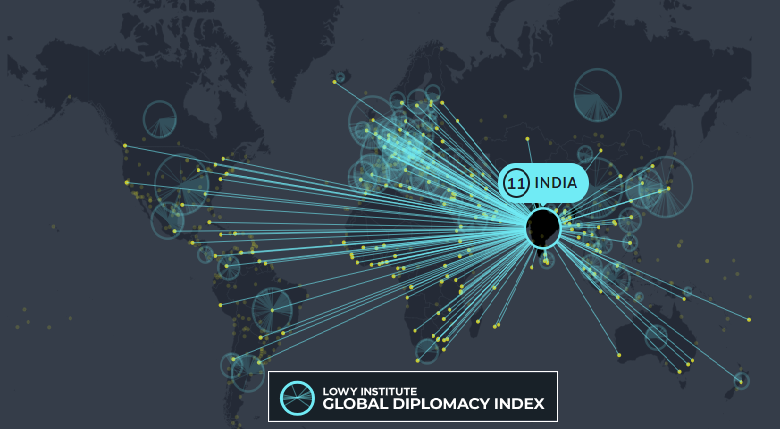
- China over the years has strengthened its diplomacy and now it’s not just big in numbers but also possesses strong financial support from its government.
- In the past 10 years, India’s diplomatic growth has been significant and consistent despite challenges.
- Summits like the G20 in the year 2023 have made it clear that India too seeks a piece of international power.
The Australian think tank Lowy Institute has released its’ 2024 Global Diplomacy Index’, which contains interesting numbers and facts. The Lowy Institute is a think tank based out of Sydney that has been researching global politics at a policy level, and strategic and economic issues since 2003. The global diplomacy index is ranked based on multiple ground-level features of each country such as diplomatic strength, active staff, financial capabilities, influence, reach and a few others. The index is massively reputed and shows a clear view of diplomatic power without being fogged by biases.
Firstly looking at the list we find that China sits at the top followed by the US, Turkiye, Japan, France, Russia, UK, Germany, Italy and Brazil, which make up the top 10. A few more important mentions are India which is ranked at 11, Spain ranked at 12 and Canada is ranked at 15.
Lowy Institute in its report has mentioned a few key findings which are as follows:
- Superpowers neck and neck: China is ahead in Africa, East Asia, and the Pacific, while the United States has the edge in the Americas, Europe, and South Asia
- The price of war: Russia’s war in Ukraine has come at a heavy cost to its global diplomatic reach
- Middle powers rising: Türkive and India have rapidly expanded their diplomatic networks in a more multipolar world
- Diplomatic backsliding: Taiwan has lost ground to China on formal recognition
- Hosts with the most: European cities top the list of the busiest diplomatic capitals, Damascus saw the most embassy re-openings, and Kabul experienced the greatest number of closures
- A rush to the Pacific: Geopolitical competition has driven a surge of new diplomatic missions in Pacific Island countries
- Asia in focus: Japan is a global diplomatic heavyweight, while Indonesia leads its diplomatic network among Southeast Asian countries
- Australia: Near the bottom of the G20 but leading the charge in the South Pacific
China over the years has strengthened its diplomacy and now it’s not just big in numbers but also possesses strong financial support from its government. Chinese diplomats enjoy immense influence in several countries and it has also been seen to influence internal matters of other countries. Past examples have been Nepal and Pakistan.
On the other hand, Spain and France seem to have become weaker along with Russia which suffers global Western backlash and is fighting against the Western efforts to isolate it from the rest of the world. Damascus is ranked as the busiest diplomatic city with the most number of new posts opened and in contrast, Kabul has lost the most number of diplomatic posts with some countries withdrawing from the region.
What Has India Done Right?
In the past 10 years, India’s diplomatic growth has been significant and consistent despite challenges. Under the Modi government and Dr Subramanian Jaishnkar’s leadership India has been successful in not just continuous participation, and having a strong presence but has also led by example in many instances and has emerged as a leader in the South Asian region. India has quickly gone from being a ‘reaction’ Oriented nation to an ‘action’ oriented nation and is an integral part of every summit. India has opened 11 new posts since 2021 and 75% of them were in Africa. India is strongly bidding to become the voice of the African Union. Summits like the G20 in the year 2023 have made it clear that India too seeks a piece of international power.
One major aspect that has helped India to present a strong case of itself in the Indian diaspora. It’s the largest in terms of numbers standing at above 18 million people, spread across several American, European, Middle Eastern, South Asian, and African countries and they all form an important community that can’t be neglected by the nation. Modi in his tenure has taken significant steps to ensure that Indian migrants stay connected to their homeland by merging the ‘Person of Indian origin’ card and the ‘overseas citizens of India’ card. This made sure that they enjoyed equal rights as Indian citizens which provoked national pride. Modi has used this advantage to strengthen relations with the United States and EU countries and the diaspora has become Modi’s biggest weapon of soft power on the international scale.
What Could Be Done Better?
Although India’s rise in the geopolitical landscape is undeniable, there is still a long way to go for the aspiring global giant. Numbers tell a similar story as the number of Indian diplomatic staff all over the world combined stands at about 800 officers, in comparison the world’s two most powerful nations US and China have about 30,000 and 8,000 officers respectively.
India with its massive population and excellent demographic advantage can easily increase its strength in a very short duration. There is no shortage of talent and it is high time that India’s ambitious dreams are Supported with some quick decisions and execution at the top level. Popular demands suggest having a dedicated examination–interview method of recruitment method which will encourage young Indians to take up the examination. At the present rate of recruitment and vacancies, it would soon become a hindrance in expanding India’s influence. This is surely a win for India and a testimony of India’s growth story although there’s still a lot to do and the ball is in India’s court.
